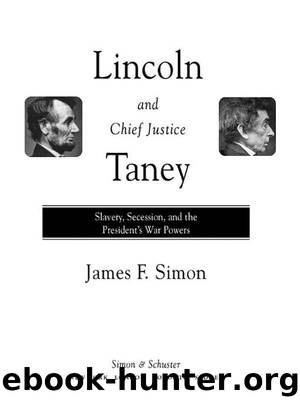Lincoln and Chief Justice Taney by James F. Simon

Author:James F. Simon
Language: eng
Format: epub
Publisher: Simon & Schuster
After Douglas had narrowly defeated Lincoln to reclaim his Senate seat, the unsuccessful challenger soberly took stock of his personal finances. “I have been on expences so long without earning any thing,” Lincoln wrote Norman Judd, the chairman of the state Republican central committee, “that I am absolutely without money now for even household purposes.” Politics had taken him away from his lucrative law practice, and he vowed to devote himself in 1859 to earning a living for his family.
But even as Lincoln resumed his daily professional chores, his mind returned again and again to the future of the Republican Party. As the 1860 presidential election approached, he worried that Republicans would repeat their mistake of 1856 when they failed to prevent the split of the anti-slavery vote in the crucial lower northern states between their candidate, John Frémont, and the American Party’s nominee, Millard Fillmore. In his private correspondence, Lincoln counseled other Republicans to reject extreme policies that could undermine the party’s appeal to the broad spectrum of anti-slavery voters.
When Ohio Republicans adopted a platform that called for repeal of the Fugitive Slave Law, Lincoln warned Ohio governor Salmon P. Chase that the platform, if adopted nationally by the Republicans, would be suicidal. “I have no doubt that if that plank be even introduced into the next Republican National convention, it will explode it,” he wrote Chase. He also opposed a constitutional amendment proposed by nativist Republicans in Massachusetts that would have prevented naturalized citizens from voting for two years. Having fought against the oppression of blacks, Lincoln wrote, he could hardly approve discrimination against “ white men, even though born in different lands, and speaking different languages from myself.” At the same time, he urged fellow Republicans to build upon the party’s anti-slavery platform of 1856 to include a modest protective tariff and federally sponsored internal improvements, policies that were popular throughout the lower northern states.
Although he steadfastly worked to enlarge the Republicans’ moderate base, Lincoln never forgot the party’s raison d’être—its opposition to the spread of slavery in the territories. Nor did he forget or forgive his perennial nemesis, Senator Douglas, whose commitment to popular sovereignty, Lincoln believed, was an insidious invitation to perpetuate slavery in the North as well as the South. After Douglas published an article in Harper’s Magazine in which he amended his Freeport Doctrine to allow territorial voters to “control” but not to prohibit slavery, Lincoln publicly attacked Douglas’s newest version of popular sovereignty. Under Douglas’s theory, he angrily concluded, one man could make a slave of another, and “neither the slave nor anybody else had a right to object.”
Lincoln’s denunciation of Douglas’s article was made in September 1859, in one of a series of speeches that he delivered at the invitation of the state Republican Party in Ohio, where Douglas was already campaigning for Democratic candidates. Though Lincoln and Douglas did not share the same platform, their exchanges effectively resumed their now famous 1858 debates. Lincoln held Douglas primarily responsible for lowering Americans’ resistance to the institution of slavery.
Download
This site does not store any files on its server. We only index and link to content provided by other sites. Please contact the content providers to delete copyright contents if any and email us, we'll remove relevant links or contents immediately.
| Anthropology | Archaeology |
| Philosophy | Politics & Government |
| Social Sciences | Sociology |
| Women's Studies |
The Secret History by Donna Tartt(18994)
The Social Justice Warrior Handbook by Lisa De Pasquale(12176)
Thirteen Reasons Why by Jay Asher(8871)
This Is How You Lose Her by Junot Diaz(6855)
Weapons of Math Destruction by Cathy O'Neil(6246)
Zero to One by Peter Thiel(5760)
Beartown by Fredrik Backman(5707)
The Myth of the Strong Leader by Archie Brown(5479)
The Fire Next Time by James Baldwin(5409)
How Democracies Die by Steven Levitsky & Daniel Ziblatt(5198)
Promise Me, Dad by Joe Biden(5127)
Stone's Rules by Roger Stone(5065)
A Higher Loyalty: Truth, Lies, and Leadership by James Comey(4937)
100 Deadly Skills by Clint Emerson(4898)
Rise and Kill First by Ronen Bergman(4757)
Secrecy World by Jake Bernstein(4725)
The David Icke Guide to the Global Conspiracy (and how to end it) by David Icke(4682)
The Farm by Tom Rob Smith(4484)
The Doomsday Machine by Daniel Ellsberg(4472)
